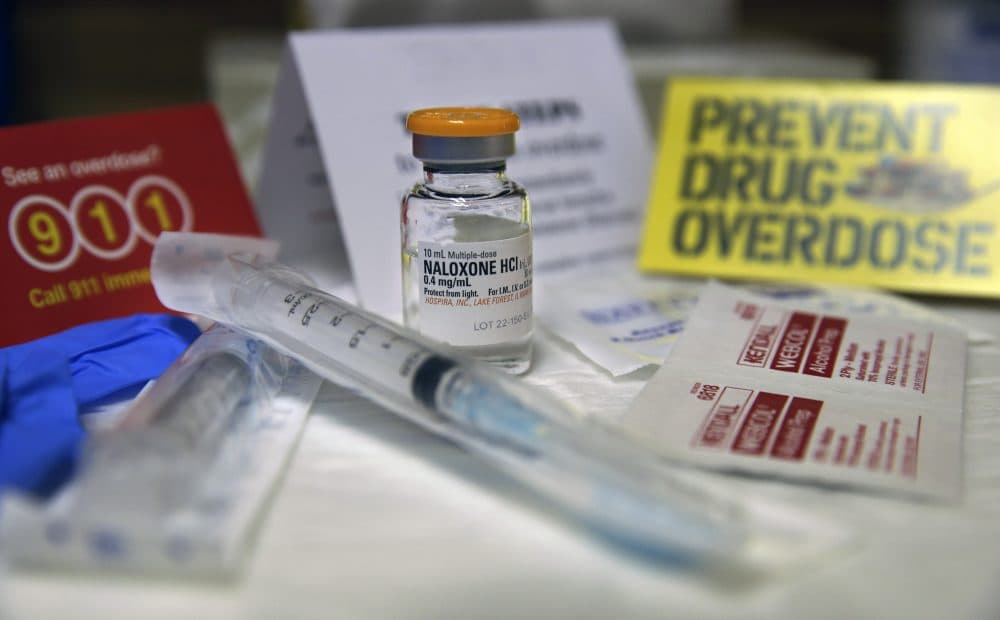Advertisement
Mass. Issues Guidelines After Boston Nurse Was Denied Life Insurance For Carrying Naloxone

Massachusetts is advising life and disability insurers not to deny coverage to good Samaritans who carry the overdose-reversal drug naloxone.
The guidelines, issued earlier this month, follow a WBUR story in December about a Boston nurse who was denied life insurance because she carries the drug.
The bulletin, from the state Division of Insurance, says rejecting disability, life or long-term care insurance applicants because they carry naloxone to help others “would defeat the Commonwealth’s important public health efforts.”
Massachusetts declared the opioid epidemic to be a public health emergency in 2014. Four years later, the state issued what's known as a standing order prescription, so residents can purchase naloxone at any pharmacy.
Some public health experts who worried that the insurance denials would have a chilling effect on the use of naloxone say they are pleased with the Massachusetts bulletin.
“[It] appears to significantly address the concerns that we were hearing regarding the use and prescribing of naloxone to family members and other good Samaritans,” said Michael Botticelli, executive director of the Grayken Center for Addiction at Boston Medical Center.
The National Association of Insurance Commissioners (NAIC), in response to an inquiry from U.S. Sen. Ed Markey, said earlier that the Massachusetts guidance “will provide a model other states can consider using.” In response to a request for comment for this story, the NAIC said it is reviewing the bulletin.
The American Council of Life Insurers (ACLI) said in a statement that it supports the Massachusetts bulletin, "which is consistent with state laws barring unfair trade practices in the underwriting process. The guidance is also consistent with life insurers common practice to rely on a variety of factors—not just one—when determining whether to provide coverage to an applicant and what to charge for premiums."
The ACLI has said that a prescription for naloxone may lead to additional questions about the request for coverage and the reason for the prescription, which are in keeping with evaluating an applicant's risk. Massachusetts regulators say they expect that insurance companies will get enough information to determine whether the naloxone prescription is relevant to the person's health, but that it alone should not adversely affect the evaluation.
Making that determination may be difficult for some agents and could lead to unfair denials.
Take the case of Dr. Dinah Applewhite, a resident at Massachusetts General Hospital. During a January interview for disability insurance, Applewhite says an agent asked several questions about why she carries naloxone. Applewhite works with patients addicted to opioids and plans to begin a program in addiction medicine in the fall.
The agent also asked why Applewhite had been prescribed an opioid in August 2018. The answer: Applewhite had a short prescription after childbirth.
Applewhite says she hasn't heard whether she'll be approved for disability insurance.
"I was surprised to be asked about the naloxone," she said. "I found myself anxiously defending why I picked up a life-saving drug."
The Massachusetts guidance also applies to applicants prescribed PrEP, the pills that prevent transmission of HIV.
“These new guidelines are clear, concise, and helpful, especially in the linkages to issues addressing HIV medications," Markey said in a statement. "Once again, Massachusetts is leading the way, and I am hopeful that other states will adopt this guidance.”
Markey highlighted the guidelines in a letter to U.S. Surgeon General Jerome Adams, who has called for more widespread distribution and use of naloxone.
"Caring friends, family members and community members should not be penalized for carrying or using naloxone," Adams said in a statement. "The guidance issued by the Massachusetts’ Division of Insurance calling on life insurance carriers to look at the way they review prescriptions for naloxone serves as a model for other states."
This article was originally published on February 12, 2019.
